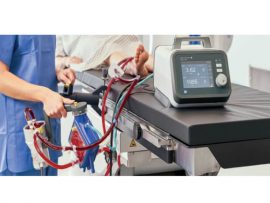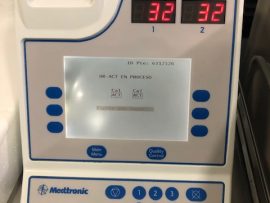The learner will be able to discuss anticoagulation strategies for patients on ECMO.
Read MoreAbstract Background: Thromboembolism and bleeding contribute to Coronavirus disease 2019 (COVID-19)’s morbidity and mortality and are also frequent complications of venovenous extracorporeal membrane oxygenation (vvECMO). As the interaction of the..
Read MoreAbstract Background To compare the safety and efficacy of low-dose anticoagulation (LA) with that of standardized dose anticoagulation (SA) for patients supported with extracorporeal membrane oxygenation (ECMO). Methods PubMed, MEDLINE,..
Read MoreAbstract Antiphospholipid syndrome (APS) is an acquired autoimmune condition characterized by the presence of antiphospholipid antibodies (lupus anticoagulant, anticardiolipin antibody, and anti-β2 glycoprotein-I antibody) which leads to clinical thrombosis via a..
Read MoreAbstract Hypercoagulability in coronavirus disease 2019 (COVID-19) may aggravate disease severity during hospitalization but the reported survival benefits from anticoagulation (AC) vary among studies. We performed a literature research to..
Read MoreAbstract We retrospectively compared anticoagulation with heparin and bivalirudin for 32 consecutive children under 18 years old during extracorporeal membrane oxygenation (ECMO) in our pediatric cardiac intensive care unit (PCICU). Between September..
Read MoreAbstract OBJECTIVES: Extracorporeal membrane oxygenation is a life-sustaining therapy for severe respiratory failure. Extracorporeal membrane oxygenation circuits require systemic anticoagulation that creates a delicate balance between circuit-related thrombosis and bleeding-related..
Read MoreAbstract OBJECTIVES: To compare current practices within the United States of anticoagulation management and blood transfusion in neonatal and pediatric extracorporeal membrane oxygenation patients with a 2013 international report. DESIGN: ..
Read MoreAbstract The 4Ts and HIT-Expert Probability (HEP) scoring tools for heparin-induced thrombocytopenia (HIT) have not been validated in cardiac surgery patients, and the reported sensitivity and specificity of the Post-Cardiopulmonary..
Read MoreAbstract Neonatal extracorporeal membrane oxygenation (ECMO) is a life-saving procedure for critically ill neonates suffering from a potentially reversible disease, causing severe cardiac and/or respiratory failure and refractory to maximal..
Read MoreAbstract This study describes the use of bivalirudin in children on extracorporeal membrane oxygenation (ECMO). Pediatric patients receiving bivalirudin were compared to patients receiving heparin as the anticoagulant on ECMO...
Read MoreAbstract Hemostasis and thrombosis are believed to be so intricately linked that any strategies that reduce thrombosis will have an inevitable impact on hemostasis. Consequently, bleeding is viewed as an unavoidable..
Read MoreAbstract Extracorporeal membrane oxygenation (ECMO) provides lifesaving circulatory support and gas exchange, although hematologic complications are frequent. The relationship between ECMO and severe thrombocytopenia (platelet count <50 × 109/L) remains ill-defined. We performed..
Read MoreAbstract Extracorporeal membrane oxygenation (ECMO) is a temporary life support system used to assist patients with life-threatening severe cardiac and/or respiratory insufficiency. Patients requiring ECMO can be considered the sickest..
Read MoreAbstract OBJECTIVES: A significant proportion of patients with coronavirus disease 2019 requiring venovenous extracorporeal membrane oxygenation at our institution demonstrated heparin resistance, which in combination with a heparin shortage resulted..
Read MoreEuroELSO Webinar on 30 March 2021 Topic: Anticoagulation monitoring on ECMO in neonates and children: moving target - anti Xa over ACT & APTT. Introduction, moderation & closing..
Read MoreAbstract Extracorporeal membrane oxygenation (ECMO) contributes to coagulopathy, necessitating systemic anticoagulation to prevent thrombosis. Traditionally, unfractionated heparin (UFH) has been the anticoagulant of choice, however, due to many inadequacies new evidence suggests..
Read MoreAbstract Objectives Heparin resistance (HR), defined as a decrease in heparin responsiveness, can result in adverse events with prolonged duration of surgery. Although some clinical risk factors have been suggested,..
Read MoreAbstract Background management during venoarterial (ECMO) is particularly difficult in postcardiotomy shock patients given a significant bleeding risk. We sought to determine the effect of treatment on bleeding and thrombosis risk for..
Read MoreAbstract Purpose Achieving effective anticoagulation during neonatal extracorporeal membrane oxygenation (ECMO) without increasing the risk of hemorrhage remains challenging. The use of antithrombin III (AT-III) for this purpose has been..
Read MoreAbstract Anticoagulation is necessary for most pediatric and adult extracorporeal membrane oxygenation (ECMO) patients to prevent circuit clotting. Inherently, the most common side effect of anticoagulation is bleeding. Anticoagulation during..
Read MoreAbstract Objectives The (COVID-19) pandemic has been associated with cases of refractory (ARDS) sometimes requiring support with (ECMO). can be used for in patients on ECMO support, but its efficacy and safety in patients with..
Read MoreAbstract Known limitations of unfractionated heparin (UFH) have encouraged the evaluation of anticoagulant aptamers as alternatives to UFH in highly procoagulant settings such as cardiopulmonary bypass (CPB). Despite progress, these..
Read MoreAbstract Objectives: Data about inhospital outcomes in bleeding complications during extracorporeal life support (ECLS) have been poorly investigated. Design: Retrospective observational study. Setting: Patients reported in Extracorporeal Life Support Organization..
Read MoreAbstract We have read with interest the report of ELSO-registry data published by Nunez and coworkers in Intensive Care Medicine analyzing risk factors for bleeding and thrombotic events (BTE) on..
Read MoreAbstract Background Anticoagulation is important for extracorporeal membrane oxygenation (ECMO). Heparin is widely used; however, in some cases, it is not suitable for patients. Bivalirudin has been recently proposed for..
Read MoreAbstract The use of extracorporeal membrane oxygenation (ECMO) for acute cardiac and/or respiratory failure has grown exponentially in the past several decades. Systemic anticoagulation is a fundamental element of caring..
Read MoreAbstract Background:A pulmonary embolism response team (PERT) is a multidisciplinary team established to improve clinical care for patients with pulmonary embolism (PE). However, data regarding detailed institutional experience and clinical..
Read MoreAbstract Anticoagulation during extracorporeal membrane oxygenation (ECMO) for Coronovirus Disease 2019 (COVID-19) can be performed by direct or indirect thrombin inhibitors but differences in outcomes with these agents are uncertain...
Read MoreAbstract Extracorporeal membrane oxygenation (ECMO) use is increasing worldwide, driven by device simplification and increasing need during the coronavirus disease 2019 (COVID-19) pandemic, while bleeding and thrombotic events remain a..
Read More















